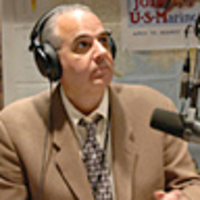Testy remarks accusing the national media of “dishonesty” and “sowing division,” by White House Press Secretary Sean Spicer underlined the metaphorical melodrama of picking-a-fight-with-those-who-buy-ink-by-the-barrel that was employed so successfully by the Trump campaign.
Chronicling the genius of Trump to make the media into the villain of the tale in order to win every contest over the last year is Rolling Stone journalist Matt Taibbi’s raucous, trenchant, knee-slapping new work, Insane Clown President: Dispatches from the 2016 Circus.
“The public hates us reporters in the best of times,” Taibbi allows. “But the summer of Trump could easily turn into an Alamo moment for the press.”
ADVERTISEMENT
Tabby enjoys an historical sense of proportion. He laments the evolution of the Edward R. Murrow “eat-your-broccoli version of the news” into “nihilistic lizard-brain sensationalism” now preferred for an audience of “thickening couch potatoes.”
Taibbi’s work is the first and perhaps most sincere example of the parade of works on “The Making of the President 2016” we are likely to see. Having published these chapters in real time, Taibbi expects throughout that that Trump will lose in an epochal massacre, not the least because Trump’s campaign “has turned the presidency into a pure high-school-style popularity contest conducted entirely in the media.”
The epilogue on the day after the election, November 9, 2017, is total mind-bending—“I’m in shock”—laughter.
Yet the Trump strength to use the media in a jujitsu move to victory might not be that original after all.
Trump’s performance of 2016 compares most favorably to the political lessons in Teddy White’s masterpiece of the television age, the John F. Kennedy vs. Richard M. Nixon contest in The Making of the President 1960.
Six decades later, White’s most abiding theme is that no candidate is qualified enough if he cannot perform on TV.
For example, an esteemed John F. Kennedy rival for the Democratic nomination, the endlessly over-qualified senator and Cabinet officer Stuart Symington of Missouri, failed to excite on camera.
“Unfortunately,” White judged, “a Presidential candidate must generate an extra-reasonable emotion; he must generate it across the press, across television and across radio, and through all the strange media of this enormous country, until it stirs the spirits of the men and women who vote.”
This compares well with Taibbi’s observation that Trump’s treatment of the well-known, well-prepared, well-funded Jeb Bush was effective because, on television, Bush did appear “’low-energy,’ ‘stiff’ and ‘dumb as a weenie’ who lets his Mexican wife push him around.”
By the time Trump told Jeb Bush in a debate that his mother, First Lady Barbara Bush, should be running instead of him, the curse of Stuart Symington was complete.
White also saw the difference between pleasing the media with sincerity and wowing the media with glamour.
“[Minnesota Senator Hubert] Humphrey [another early Kennedy rival] was always good for a fine, sparkling quote or a quick disquisition in almost any realm of national policy,” White reported. “But the quick disquisition and his opinions, by being so easily available, were devalued.”
Youthful but inexperienced Senator Kennedy became the media’s darling for the simple reason that he was very good on camera: “The press, charmed by Kennedy, entranced by the purr of his political machinery, slowly fastened on the candidate from Massachusetts as the winner.”
Taibbi’s up-to-date version of 1960—how to attract the media like Kennedy while at the same time assuring that it doesn’t find you easy like Humphrey—is to deliver ratings.
Trump, says Taibbi, “is the first to realize the weakness in the system, which is that the watchdogs in the political media can’t resist a car wreck.”
White noted that in 1960 not only was TV freshly freed from the equal time legislation in Congress, but also eighty-eight percent of America’s 44 million families had TV sets at home, leaving many star-struck by Kennedy’s matinee looks and easy ability to pronounce, “Hahvahd.”
Still, the TV battle did not have to be a one-sided contest for Kennedy. White faulted Nixon for not heeding his campaign television advisers to produce chatty documentaries with the candidate in action such as a show called “Khrushchev As I Know Him,” or “You and Your Family in 1960.”
White reported that Nixon, anxious about “his deep eye wells and heavy brows” in the four TV debates, held back from buying any Republican campaign airtime from the July 25 Chicago convention through October.
When Nixon finally did go on air the last day of the campaign, November 7, it was for an ABC network four-hour telethon from Detroit that included a now hard-to-believe dialogue with Ginger Rogers on the “high cost of living.”
What Taibbi sees is that Trump, a child of the television age, bundled up all the flabbergasting gimmicks of candidates for the last 56 years and topped them with something more spectacularly unlikely than even yelling at Khrushchev or penny-pinching with Ginger Rogers, that is, the gambits of televised Wrestlemania.
“Interestingly,” writes Taibbi, “a lot of Trump’s political act seems lifted from bully-wrestlers. A clear influence is ‘Ravishing’ Rick Rude, an Eighties champ whose schtick was to insult the audience.”
White does not close his book with warnings about the media taking control of the presidency. Those were more perilous times than now, the original Cold War, and so the grown-ups didn’t turn-up hyperbole. The nearest White comes to a judgment is to conclude that Nixon “panicked” about his presentation on television and handed an advantage to the unruffled underdog Kennedy.
Taibbi does sound an alarm that the media will now sell the presidency as a “freak show,” adding “Trump won because he grasped instinctively that the campaign trail was more TV show than democracy.”
The wintry pleasure of Insane Clown President is that, just as it updates us on the discoveries of Teddy White, someday six decades from now the Millennials of today, when they recall Taibbi, will smile at the quaintness of “the summer of Trump.”





